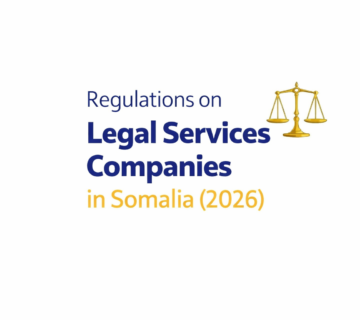INTRODUCTION
The Attorney-General holds the national mandate to initiate, manage, and oversee prosecutions and related legal proceedings.[1] Under Article 8 of the Organization of the Judiciary, Legislative Decree No. 3 of 12 June 1962, the Office of the Attorney-General is tasked with upholding and enforcing the law, while safeguarding the interests of the State, public institutions, and individuals lacking legal capacity.
On 7/8/2025, the Attorney General of Somalia issued a directive assigning public prosecutors to the Banadir Region, one of the country’s most populous administrative regions. This arrangement stems from Somalia’s federal structure, under which each federal member state has its own Attorney General whose jurisdiction is restricted to that state’s territorial boundaries. Consequently, the authority of the national Attorney General is effectively limited to the Banadir Region. However, this limitation is not exclusive to the Attorney General’s Office; it similarly applies to all public institutions based in Mogadishu.
The Office of the Attorney General’s assignment of prosecutors appears to be an administrative measure aimed at matching prosecutorial capacity with the courts’ structure and workload. This method of assigning personnel such as designating prosecutors specifically for the Supreme Court, Banadir courts, and other district courts is consistent with principles of workload distribution and organizational efficiency.[2]
In practice, this alignment is reflected in the current allocation system: The Supreme Court has been assigned only 11 prosecutors, while Banadir which handles the highest number of cases relies on prosecutors assigned as needed to manage its caseload. Other district courts, such as the Central Court, Waliyow Addow, and the Eastern and Western Divisions of the Banadir Region, each have two prosecutorial divisions, bringing the total number of prosecutors in these courts to 19.
According to World Population Review, the capital city of Somalia has an estimated population of over 2.8 million in 2025.[3] With only 19 prosecutors assigned to the Banadir Region, this amounts to approximately one prosecutor for every 150,000 residents an imbalance that severely hampers the effective delivery of justice.
From an administrative perspective, this is best interpreted as a division of work rather than a deliberate restriction on prosecutions. Banadir’s reliance on assigned personnel reflects a flexible model, likely intended to address its high caseload, whereas fixed prosecutorial divisions in other courts ensure consistent coverage.
However, the allocation figures raise a secondary concern: capacity limitation by default. The Supreme Court’s assignment of only 11 prosecutors may, in practice, constrain its ability to process cases promptly if the caseload exceeds prosecutorial capacity. Similarly, fixed assignments in district courts could create bottlenecks if case volumes spike unexpectedly.
Finally, the prosecutorial allocation system appears organizational in design but could inadvertently create functional limitations if staffing levels are not periodically reviewed against real caseload data. Continuous monitoring and flexible reallocation are essential to avoid de facto restrictions on the right to prosecution and judicial efficiency.
[1] Legal Archives Center, ‘The Office of the Attorney General Of Somalia’ (2024) available at https://lac.so/office-of-the-attorney-general-of-somalia.
[2] Naphatal & Others vs. Attorney-General, consolidated constitutional petition No. 42 & 52 of 2012 available at file:///C:/Users/previ/Downloads/Naphatal%20Were%20and%20Another%20v%20Attorney%20General%20(Consolidated%20Constitutional%20Application%20No%2042%20of%202012%20Consolidated%20Constitutional%20Application%20No%2052%20of%202012)%202021%20UGCC%209%20(9%20March%202021).pdf.
[3] World Population Review (2025) available electronically at https://worldpopulationreview.com/cities/somalia/mogadishu.






No comment